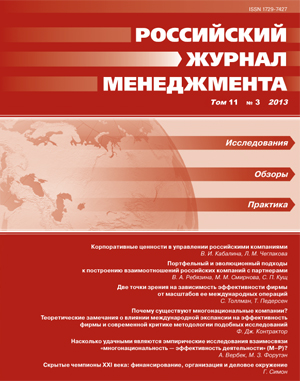Корпоративные ценности в управлении российскими компаниями
Аннотация
В статье освещаются результаты исследования использования управления на основе ценностей как нового подхода к управлению российскими компаниями. Его целью было выявление общих черт и различий в подходах российских компаний к созданию корпоративной системы управления, основанной на ценностях, с учетом разнородного контекста — внешней и внутренней среды организации. Исследование основано на применении метода сравнительного исследования кейсов компаний, или множественного кейс-стади (multiple case studies). В качестве эмпирических объектов выбраны три компании разного размера и отраслей (добывающая промышленность, финансы и девелоперский бизнес). Формирование управления на основе ценностей рассматривается как процесс, проходящий несколько стадий. Помимо факторов успешности процесса создания системы
ценностно-ориентированного управления и сложностей данного процесса, в статье также обсуждаются вопросы соотношения личных и корпоративных ценностей.
Ключевые слова:
управление на основе ценностей, личные и корпоративные ценности, стадии и механизмы внедрения управления на основе ценностей
Скачивания
Библиографические ссылки
The List of References in Cyrillic Transliterated into Latin Alphabet
Загрузки
Опубликован
Как цитировать
Выпуск
Раздел
Лицензия
Статьи журнала «Российский журнал менеджмента» находятся в открытом доступе и распространяются в соответствии с условиями Лицензионного Договора с Санкт-Петербургским государственным университетом, который бесплатно предоставляет авторам неограниченное распространение и самостоятельное архивирование.





